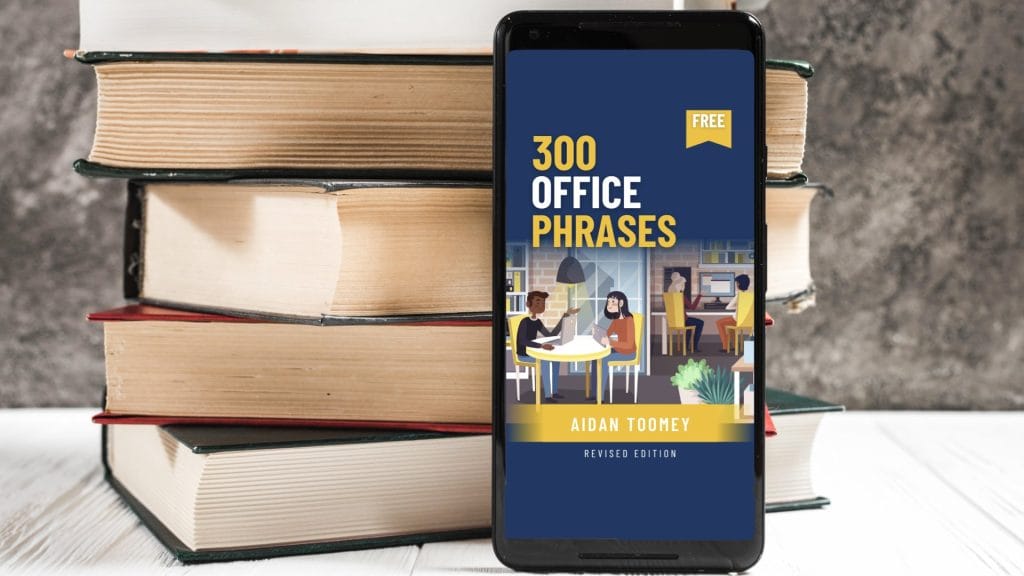
Enhance your Business English, sound more confident, and adapt quickly in any professional situation.
Introduction
Have you ever been in a meeting where plans suddenly changed, and you weren’t sure how to respond?
In today’s fast-paced business world, flexibility is key. Mastering idioms like “play it by ear” can help you handle unexpected situations with confidence and sound more natural in your Business English conversations.
In this guide, we’ll explain the meaning of this phrase, show you real-life examples, and provide practical tips to use it effectively in the workplace.
Before continuing, it’s recommended to download the FREE PDF below to aid your learning.
And don’t forget to like and follow us on YouTube and LinkedIn!
Further Toomey Business English sources such as our Business English Training can be found at LinkTree
Also, why not pick up a SPECIAL OFFER for our Business English Office Phrases Course at:
https://toomeybusinessenglish.com/office-phrases-business-english/
1. What Does “Play it by Ear” Mean?
The phrase “play it by ear” means handling a situation without a fixed plan and adjusting as events unfold. In business, this indicates you are adaptable and can respond easily when plans change.
2. Why Is It Important in Business?
The modern workplace is full of surprises—a meeting may have no set agenda, or client requests may change suddenly. Being able to “play it by ear” demonstrates that you are:
- Ready to handle unexpected challenges
- Flexible
- Resourceful
3. Examples of “Play it by Ear” in Business
Here are some examples of how to use “play it by ear” in professional situations:
- Client Meetings
If a client hasn’t shared an agenda, you might say:
“We’ll play it by ear and focus on the topics they raise.” - Project Management
When deadlines depend on unpredictable factors, say:
“The timeline depends on our supplier’s delivery. We’ll play it by ear and adjust as needed.” - Presentations
If unsure how long your presentation will last, try:
“I’ve prepared key points, but I’ll play it by ear depending on the time available.” - Team Brainstorming
During a brainstorming session, you could note:
“Let’s play it by ear and see where the discussion takes us.”
4. How to Use “Play it by Ear” in Conversation
Here’s an example dialogue to show how this phrase can be used naturally in a business context:
Joshua: Hi Kayla, do we have a plan for the client meeting today?
Kayla: Not really. I thought we’d play it by ear and focus on what the client wants to discuss.
Joshua: I feel more comfortable with a detailed plan. What if the client expects a specific proposal?
Kayla: Good point. Let’s prepare a basic agenda and then play it by ear as the meeting unfolds.
Joshua: That sounds like a great balance.
This exchange shows how to mix preparation with flexibility.
5. Common Mistakes & When to Avoid “Play it by Ear”
While “play it by ear” is a useful phrase, it’s important to use it correctly. Here are some common mistakes to avoid:
- Overusing the Phrase
Using “play it by ear” too often can make you seem unprepared. Use it only when flexibility is genuinely required. - Using It in Formal Settings
Avoid using this phrase in highly formal situations, such as:- Legal or compliance meetings
- Financial reporting discussions
- Board presentations
6. Alternative Business Phrases
If “play it by ear” doesn’t fit the situation, try these alternatives:
- “Let’s remain flexible.”
- “We’ll adapt as we go.”
- “We’ll take it as it comes.”
- “Let’s see how things unfold.”
- “We’ll adjust based on the situation.”
These phrases convey a similar meaning while maintaining a professional tone.
7. Practical Tips for Mastering Idiomatic Expressions
- Pair Flexibility with Preparation
While “play it by ear” suggests flexibility, it’s always a good idea to have a basic plan in place. For example:
“We’ll prepare a draft agenda but play it by ear during the meeting to address any unexpected topics.” - Use Idioms Sparingly
Overusing idiomatic expressions can dilute their impact. Use “play it by ear” only when it’s the best way to describe your approach. - Follow Up with Action
After “playing it by ear,” make sure to follow up with concrete actions or plans to ensure clarity and accountability.
Watch the Video Lesson
For a deeper understanding of “play it by ear,” watch our video lesson on YouTube below:
Share This Article
If you found this guide helpful, share it with your network to help other professionals improve their Business English skills!
FREE Resources to Support Your Learning
Grab our Ultimate 300 Business English Phrases for Communication in the Office ebook further below. Visit our FREE Business English lessons page.
Ready to Master Idioms in Business English?
Do you want to confidently use idioms like “play it by ear” in your professional communication? Idioms are a powerful way to sound natural, build rapport, and express yourself effectively in Business English.
Book a free 15-minute consultation to discover how personalised coaching can help you:
- Use idioms naturally in interviews, meetings, and workplace conversations.
- Understand the cultural nuances behind idiomatic expressions.
- Build confidence in your Business English communication skills.
Our targeted training has helped professionals from over 30 countries master idioms, improve fluency, and communicate with impact in the workplace.
Find out more at: https://toomeybusinessenglish.com/business-english-training/
If You Liked This Article, Try These Next!
- Move the Goalposts – Business English Phrase of the Day
Discover how to use this idiom to describe shifting expectations or changing rules in a professional context. - Wow Factor – Business English Phrase of the Day
Learn how to use this phrase to highlight something impressive or impactful in business settings. - Have a Lot on One’s Plate – Business English Phrase of the Day
Understand how to use this idiom to describe being busy or overwhelmed with tasks at work.
GET YOUR FREE EBOOK!
FREE! THE ULTIMATE 300 BUSINESS ENGLISH PHRASES FOR COMMUNICATION IN THE OFFICE

